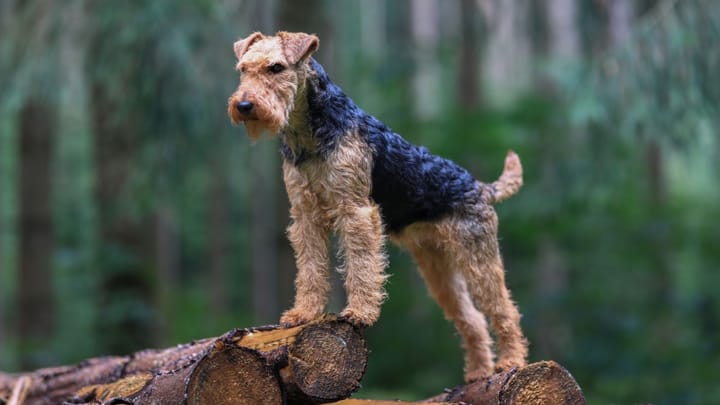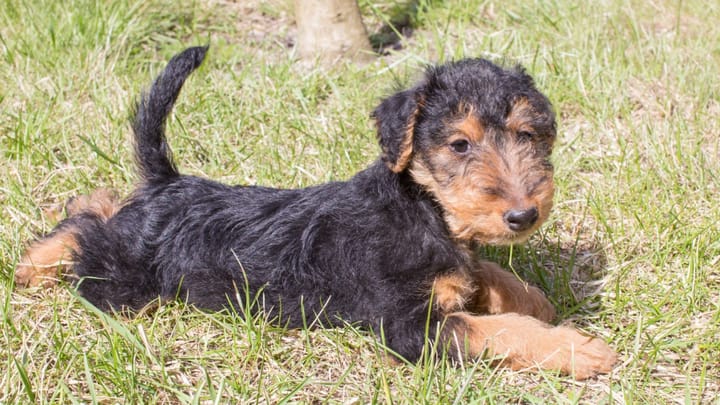Welsh Terrier
Other name: Welshie


Originally bred in Wales, the Welsh terrier is one of the oldest terrier breeds known. Previously named the Black and Tan terrier, when the breed was standardised in 1885 by the UK Kennel Club, the name was changed. Welsh terriers were bred for vermin control on farms and also to hunt otters, badgers and foxes. The happy and energetic terrier has a zest for life and a wonderful attitude and certainly great self-determination.
|
Life expectancy |
The Welsh Terrier has a life expectancy of between 12 and 14 years |
|
Temperament |
|
|
Size |
Medium
|
|
Adult size |
Female
Between 14 and 15 in
Male
Between 14 and 15 in
|
|
Adult weight |
Female
Between 20 and 22 lb
Male
Between 20 and 22 lb
|
|
Coat colour
Black and tan, or black grizzle and tan. |
Black Blue Brown |
|
Type of coat
Medium length hair. The Welsh Terrier has a double coat that is dense, wiry and coarse. |
Long |
|
Eye colour
Dark eyes that are round in shape. |
Brown
|
|
Purchase price |
The Welsh Terrier costs between £650 and £950 |
The Welsh Terrier dog is among just a very few dog breeds that sweat or perspire. As he is a very active dog, you may notice an obvious body odour. You certainly cannot use antiperspirant deodorant on him, so we would suggest frequent baths to keep him smelling sweet!
More details about the Welsh Terrier
Welsh Terrier: Origins and history
The Welsh Terrier is one of the oldest known dog breeds in the UK, dating back many centuries. With his high energy levels and abilities to eradicate vermin and hunt small game, he is a competent working dog. In some circumstances, the breed has been used alongside hunting hounds, giving chase to otters, badgers and foxes.
Previously known as the “Black and Tan Wire-Haired Terrier”, the breed name was changed to “Welsh Terrier” in 1885 in the UK. Although many of these dogs are now used for showing purposes, the breed appears to be dying out and is now classified by the UK Kennel Club as a rare breed.
Physical characteristics of the Welsh Terrier
This breed has a very similar appearance to the Airedale and the Lakeland Terrier. This breed is of medium build with a wiry coat, and either black and tan or black grizzle and tan in colour. Even though it’s an illegal practice, tail docking does sometimes take place. New-born puppies from this breed are generally born solid black, then their coat changes shade as they get older.
FCI classification of the Welsh Terrier
-
Group 3 - Terriers
-
Section 1 : Large and medium sized Terriers
Welsh Terrier: Characteristics
Welsh Terrier: Behaviour
Training a Welsh Terrier
Once you begin the training process, the Welsh Terrier is usually happy to commit. His independent streak will sometimes mean he doesn’t listen to you, but on the whole, he is keen to learn new skills. It’s advisable to teach the dog that his master is the pack leader and try to vary the training activities to keep the dog keen.
Welsh Terrier: Lifestyle
Breed compatibility Welsh Terrier
Welsh Terrier: Purchase price
The initial purchase cost to buy a Welsh terrier puppy is between £650 to £950.
They aren’t known to be an expensive dog to care for and feed. As hardy canines, their health visit costs won’t be too high. Consider though that they do need to visit the grooming salon to strip out their thick coats several times a year. You should budget between £40 to £50 overall monthly cost for this breed, to take into account pet insurance, grooming, veterinary visits, vaccinations and of course his food bills.
Welsh Terrier: Shedding
Light
This dog generally has no loss of hair through moulting, hence the need for him to be trimmed around 3-4 times annually.
Welsh Terrier: Grooming
The outer coat of this breed is quite thick and at a minimum, weekly brushing or combing is suggested. In addition, because of the wiry dense coat, the dog will need to be trimmed a few times each year. Hand stripping the coat hair is a possibility, but it's very time consuming.
Welsh Terrier: Health
This breed often live to a ripe old age of between 12 to 14 years.
As a member of the canine “Terrier” group, this dog is a brave, hardy pup who is bred to pursue rats, badgers and foxes.
As a canine with a thick dense coat, trimming and stripping the hair is advised, especially during the warm summer months. However, this robust dog generally tolerates the heat quite well, with no issues.
This delightful terrier has a double-layer coat that protects the dog, no matter what the weather. His waterproof coat offers protection when he is out hunting in all climates, even in rain and snow.
Providing he receives a sufficient amount of daily exercise, and this breed needs quite a lot, his high energy activities will prevent him from gaining too much weight. On the other hand however, a pup that remains at home and lays on the sofa most of the day, will certainly become overweight very quickly.
The Welsh Terrier is susceptible to some health issues. These are:
- Hip dysplasia
- Achalasia
- Legg-Calvé-Perthes syndrome
- Addison's disease
- Eye concerns such as glaucoma
- Food sensitivity and allergies
- Epilepsy
- Hypothyroidism





